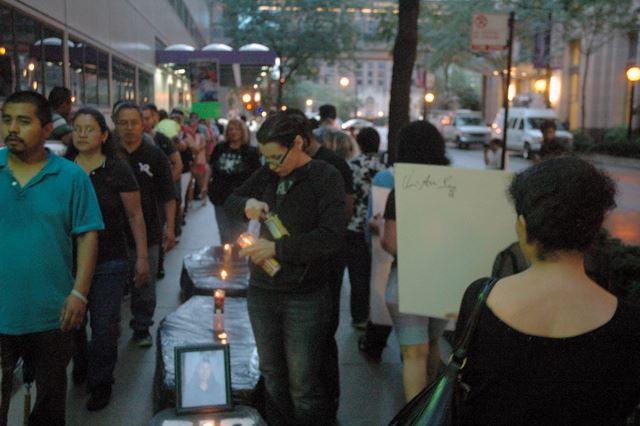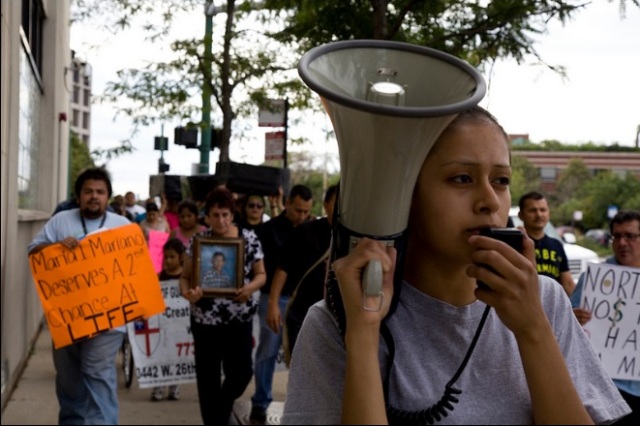Activists 'Fight For Life' Outside Northwestern Memorial Hospital
By aaroncynic in News on Aug 13, 2013 4:00PM

Photo by Aaron Cynic
Dozens of demonstrators marched seven miles from a Little Village church to Northwestern Memorial Hospital over the weekend to call attention to the death of a community member they say died because she was denied an organ transplant. Sarai Rodriguez, one of 14 people who went on a 10-day hunger strike to protest Northwestern and other hospitals for allegedly denying to add them to transplant lists over documentation, died on Friday shortly after they ended their strike. In a press release prior to the march and vigil, Rodriguez’s mother said “I ask the community to join us in confronting, because I blame Northwestern Memorial Hospital for the death of my daughter.”
Last week, demonstrators met with the hospital to discuss their demands. In a press conference outside Northwestern Memorial, they celebrated their ability to be added to the transplant lists regardless of their immigration status. Northwestern Memorial, however, said that its policy had never been to deny a patient a transplant list for lacking documents. In a statement sent to Chicagoist, Kris Lathan, the hospital's director of public and media relations said:
“Our policies have not changed, are not new and different and were in place long before Father Jose’s (Landaverde) sit-in activities. All prospective candidates for transplant are evaluated against a rigorous set of standards; however, U.S. citizenship is not among them. The criteria for recipient selection are the same for every candidate regardless of citizenship or other immigration status.”
While the demonstrators recognized the hospital was trying to work with them on the issue, it was too late for Sarai. In a press conference in front of the hospital Sunday evening, Father Jose Landaverde said:
“Friday we had people calling to the hospital to make appointments for the transplants and they told them they would not scheduled them for transplants because of their legal and economic status. We are here to denounce them and make them accountable for this death.”
Rodriguez’s mother Victoria said her daughter was denied a liver transplant in March because she was she was uninsured and could not pay for the procedure. Blanca Gomez, another immigrant in need of a kidney transplant, also said that she was told by Northwestern she was not qualified to be on the transplant list because she lacked a social security number and health insurance. While immigration status from Northwestern and other hospitals might not be a determining factor for a patient like Gomez, insurance and a social security number would.
After camping out overnight in front of the hospital, several members of the group entered the hospital again yesterday to demand to speak with officials. Carrying a large casket which read "Sarai was denied care. How Many More?", they delivered a letter to hospital administrators. According to demonstrators outside the hospital, Northwestern agreed to treat Blanca Gomez. In another statement sent to Chicagoist, Kris Lathan said:
"The transplant center at Northwestern Memorial Hospital provides transplantation services to patients with end-stage organ failure who have met listing criteria. All potential recipients are evaluated according to, and in compliance with, federal regulations regardless of nationality or immigration status. Northwestern Memorial’s transplant center follows a consistent set of policies for all patients, regardless of nationality, immigrant status, or insurance coverage...As of August 12, seven people have contacted Northwestern Memorial’s transplant program specifically referencing Father Jose Landaverde. Five of those individuals have scheduled appointments for evaluation and two are in the process of being scheduled."
Gomez was called yesterday and offered an appointment within two weeks. According to a statement released this morning, the group will not end their efforts until all 14 previous hunger strikers are placed on waiting lists. They plan to continue negotiations with local hospitals with the support of Dr. David Ansell from Rush University Medical Center, who is heading up a round table of local hospitals to develop a network to treat patients who are poor, uninsured or undocumented.
